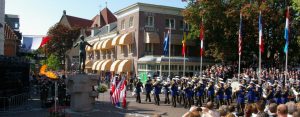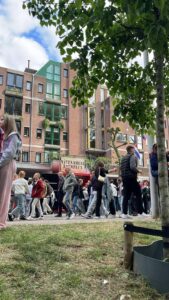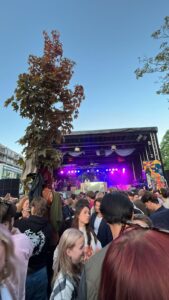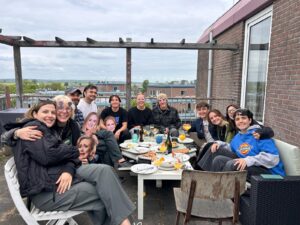Liberation Day in Wageningen as an International Student
It is considered an important event because it reflects on freedom, democracy and the importance of living in a free society. To celebrate the absence of war and the restoration of the state, people in the Netherlands organise large-scale events such as parades, festivals and concerts. On that day, provincial cities host their own Liberation Day Festival, which is free to attend.
What happens on May 5th?
Short historical summary: Liberation Day (Bevrijdingsdag) is celebrated annually on May 5th in the Netherlands. It commemorates freedom and the end of Nazi occupation during the Second World War in 1945. Coming right after Remembrance Day, Liberation Day is observed as a public holiday once every five years. Since 2025 is one of those years, most schools, businesses, and offices remained closed.
How Wageningen Marks Liberation Day
On May 5, 1945, at Hotel de Wereld in Wageningen, Canadian General Charles Foulkes and German General Johannes Blaskowitz agreed on Germany’s surrender, marking the end of Nazi occupation and making Wageningen a symbol of Dutch freedom.
Wageningen take Liberation Day very seriously by organising open-air festivals, concert stages and events in advance. The construction begins the week before the celebration, so you can imagine some roads being blocked for use. Roughly over 100,000 people attend the annual celebration in Wageningen, including the military parade with veteran soldiers. People in Wageningen think it’s important to reflect on the past and that freedom is not something to be taken for granted. The whole city comes together with one focus: celebrating the 5th of May.
First-hand experience
Together with my friends, we organised our days weeks in advance. The celebration takes place throughout the city centre as it includes multiple open-air stages, so we decided to build up energy first. Coincidentally, the 5th of May is also Adele’s (my favourite music artist’s) birthday, so I hosted an Adele-themed brunch to enjoy homemade food and drinks. Later on, we hopped on our bikes and entered the centre. It was a beautiful chaos, and we tried to go to every event marked in the Liberation Day Map. We were jumping from one stage to another, enjoying the music, watching the parade and snacking in between.
The atmosphere in the city was very lovable, and you could see excitement on people’s faces. It was also a great moment for us to have a deeper understanding of the Dutch culture of celebration through music, performances and street food. We stayed in the city until the concerts were over (around 11 pm) and were grateful for an unforgettable experience.
Main takeaways
Liberation Day is very chaotic and can sometimes be overwhelming because of the crowd. If you plan to celebrate it, my advice would be to have a plan for what you want to do. Make use of the maps that are usually available in physical and digital forms. Keep yourself energised and hydrated. Apart from the central stage, there are also a few smaller stages with exciting performances and music. This requires walking through the crowd, so stay in touch with friends if you are celebrating it in a group. And lastly, make the best of the day, be open to trying new things, immerse yourself in the unique atmosphere and enjoy.
Liberation Day is one of many events full of celebration in Wageningen, so if you want to know more about similar festivities, check out our Instagram page and previous international students’ blogs.
Cheers,
Samir





